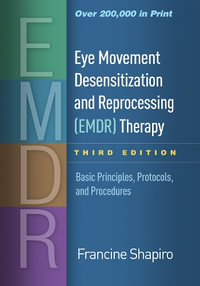Impulsivity features prominently in contemporary descriptions of many psychiatric disorders, and is also a key element in the clinical risk assessment of violence. Thoroughly examining the nature, assessment, and treatment of impulsive conduct, this up-to-date volume brings together contributions from prominent researchers and clinicians in both mental health and correctional settings. Chapters illuminate our current understanding of impulsive behavior from conceptual, legal, and biological perspectives, and address the challenges of describing and measuring it. Special features include several invaluable 20-item checklists designed to aid in risk evaluation with mentally disordered persons, potentially suicidal correctional inmates, spousal assaulters, and sex offenders. Impulsivity provides a comprehensive overview of the current state of the research and delineates a broad, clinically pertinent agenda for future study.
Industry Reviews
"Take an interesting idea of developing practical relevance, secure the services of insightful thinkers from a wide range of disciplinary backgrounds (including dissidents), arrange a conference and then have the papers skillfully edited into a coherent and structured volume full of stimulating ideas. That is what Chris Webster and Margaret Jackson have done with Impulsivity. A very wide range of issues and perspectives are considered, although more on the positive, socially valued, aspects of impulsivity would have been appreciated. From different disciplinary perspectives to applications to particular groups of people; from implications for risk assessment to different approaches to treatment, in 23 chapters. Different readers will find the volume timely for their own particular reasons; for me, as a lawyer, it is the recognition of the need to move away from dichotomous cognitive tests of responsibility toward assessments of ability to control behavior, to change, and to learn. This is a very stimulating and rewarding collection." --David Carson, L.L.B, Reader in Law and Behavioural Science, Faculty of Law, The University of Southampton "Impulsivity: Perspectives, Policy, and Practice is an important and impressive collection of state-of-the-art reviews on theoretical, empirical, and clinical aspects of impulsivity, and the technology for its assessment and treatment. This book gives a lucid and readable account of the state of professional knowledge on impulsivity, then delivers a series of thoughtful and practical analyses of the implications and applications of this knowledge. This valuable resource for researchers and clinicians should go a long way toward 'bridging the gap' between knowledge and practice concerning issues of impulsivity, particularly as it pertains to risk for violence. This book squarely delivers on its promise as a comprehensive treatise on impulsivity, but it goes even further to make a significant contribution to the professional literature on violence risk assessment. This is the most comprehensive and definitive reference on impulsivity currently available." --Randy Borum, PsyD, Department of Psychiatry and Behavioral Sciences, Duke University Medical Center "This book is a major contribution to the field. It is a very well written, wide-ranging, informative, and useful exploration of the nature, assessment, and treatment of impulsive antisocial behavior in adults and older adolescents. It also provides excellent guidelines for conducting violence risk assessments in a variety of circumstances. Impulsivity: Perspectives, Principles, and Practice should be required reading for all doctoral students in clinical psychology and related fields; and many practicing clinicians and other professionals who are concerned with impulsive individuals will find the book to be well worth reading and having on their shelves." --Thomas R. Litwack, PhD, JD, Professor of Psychology, John Jay College of Criminal Justice .,."includes contributions from some of the most prominent North American authorities and researchers in the field of forensic mental health. This has resulted in a comprehensive, up to date, well-referenced text which will provide an invaluable resource for any clinical, academic or professional body working with a community of inpatient forensic samples. The contents are clearly expressed and presented in a coherent digestible format. Overall, this book warrants inclusion on reading lists for those interested in understanding concepts of impulsivity/aggression and risk management in a variety of disorders and situations. Its style lends itself to a wide readership, from those working with mentally disordered offenders in all settings to postgraduate doctorate students." --"Criminal Behavior and Mental Health" .,."a substantial contribution to the psychological, criminological, and psychiatric literature on the topic of impulsivity....[An] important volume, a useful reference document primarily for forensic mental health practitioners." --"Canadian Journal of Psychiatry" "One of the distinctive features of this book is its many checklists, scales, and neuropsychological tests....this is the most comprehensive book I have read on the subject of impulsivity. The extensive review of previous research in the field renders it a vast reference resource. The volume adds significant contributions in the clinical study and assessment of impulsivity and risk of violence. The highlight of this book is the section on treatment. The authors offer a very creative model of treatment, which could potentially bring significant change among a population that has thus far been consideredhopeless. Every student and practitioner of forensic psychiatry should read this book." --"J Am Acad Psychiatry Law" "The authors approach impulsivity from many different angles. The diversity of viewpoints provides for a richness of thought....The editors and authors have compiled a fine book on impulsivity and aggression. This text will be a valuable reference for both the clinicians who treat impulsive patients and the academics who research aggression." --"Psychiatric Services"
























